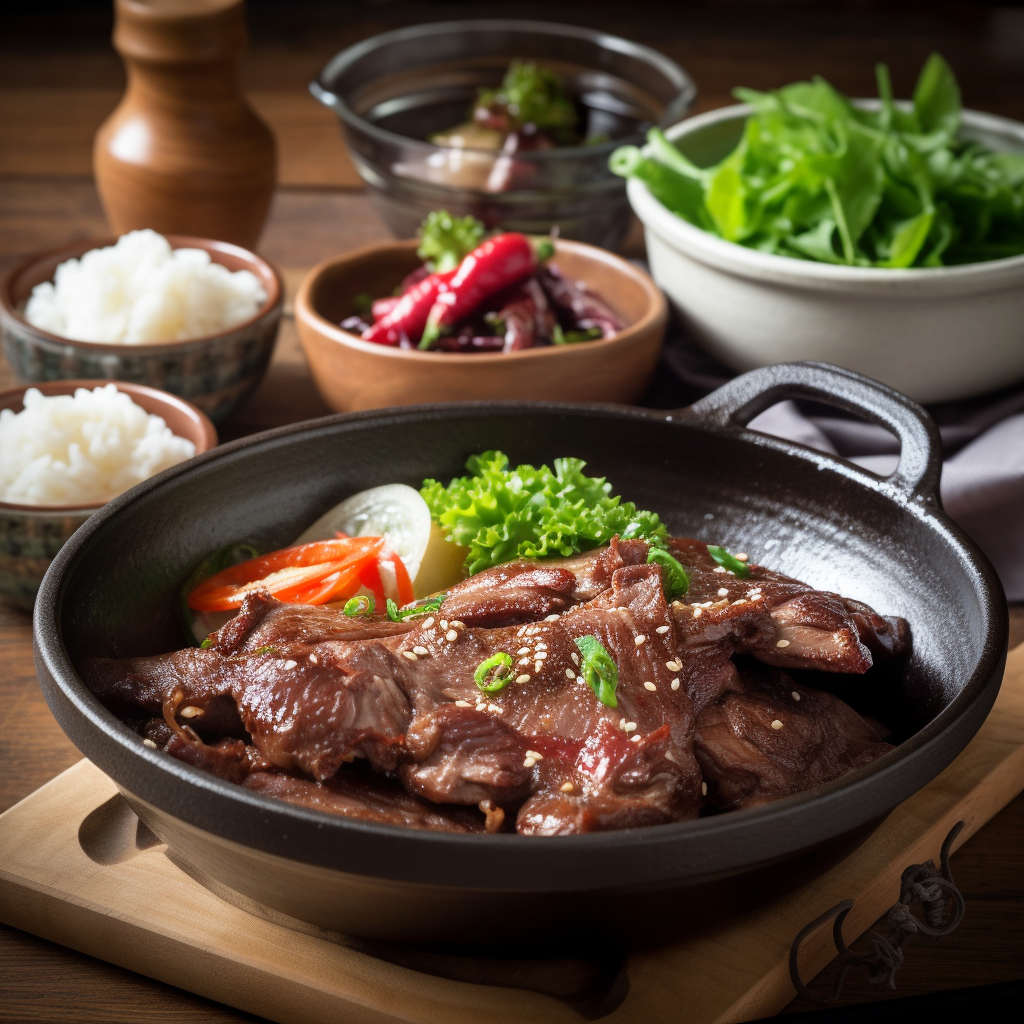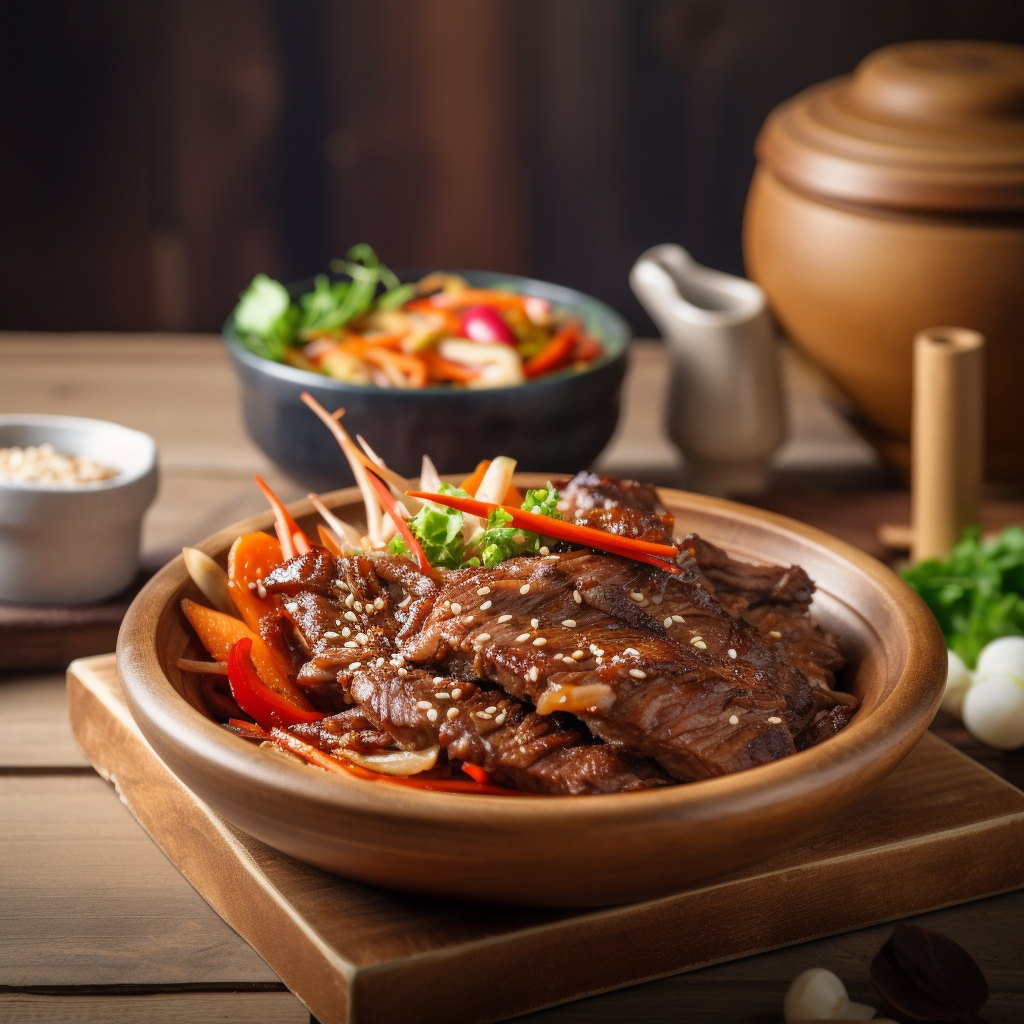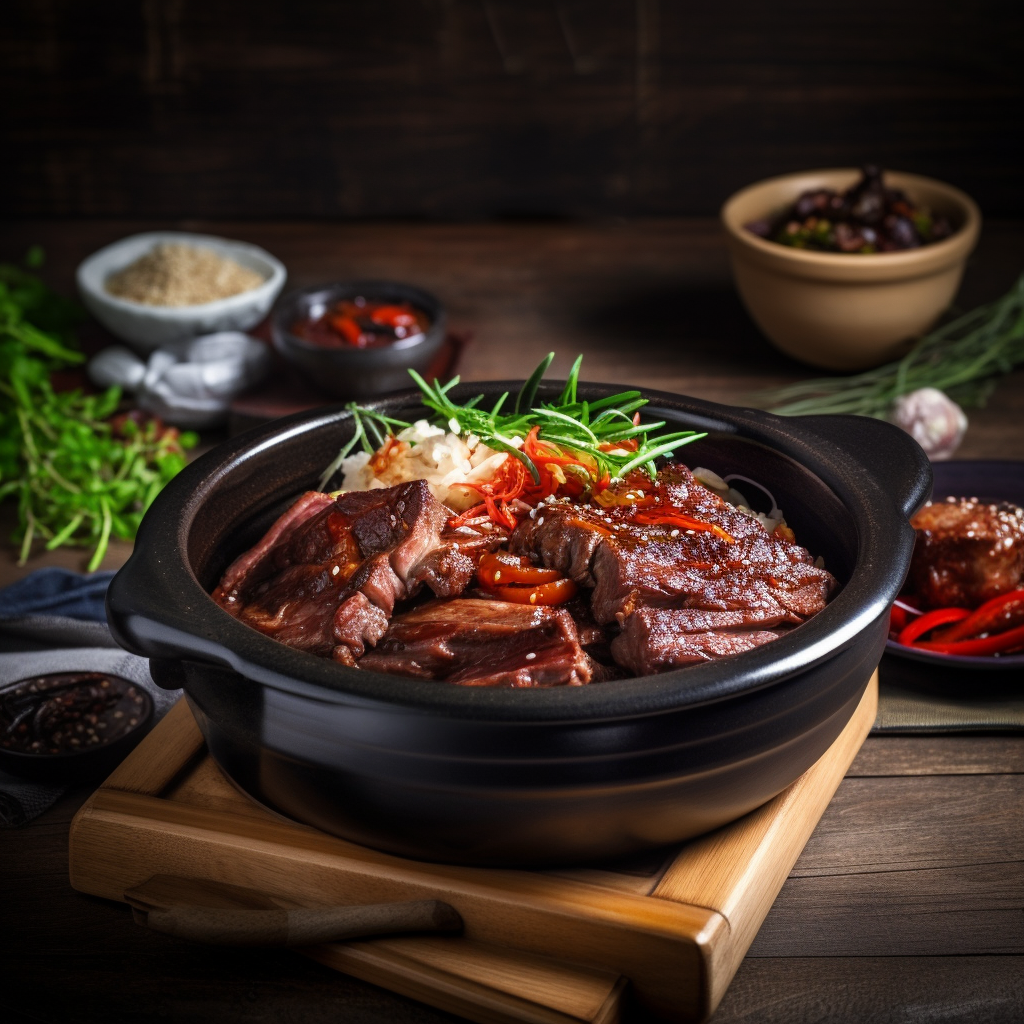Hey! have you ever tasted Galbi Jjim dish that not only tantalizes your taste buds but also warms your heart with memories of home? Join us on a flavorful journey through Korean cuisine as we explore the delightful world of galbi jjim. This savory and succulent dish, featuring tender beef short ribs simmered in a rich and aromatic sauce, is a beloved staple of Korean cooking, cherished by families for generations.
Growing up, my grandmother’s galbi jjim along with Korean Corn Dog and Tteokbokki was a cherished treasure in our family. The tantalizing aroma would fill the air as she lovingly prepared this dish, each ingredient carefully chosen and every step executed with precision. I can still vividly remember gathering around the table with my loved ones, eagerly awaiting the moment when the first tender bite of galbi jjim would touch my lips.
As I grew older, I found myself craving the comforting flavors of my grandmother’s galbi jjim, yearning to recreate those cherished memories in my own kitchen. With each batch I made, I felt a connection to my roots, a sense of pride in carrying on a tradition passed down through generations. And with each bite, I was transported back to those precious moments spent with family, laughter echoing in the air and love infusing every dish.
Join us as we embark on a journey filled with savory delights and heartwarming memories, celebrating the magic of galbi jjim and the love that goes into every delicious bite.
What is Galbi Jjim?
Galbi jjim is a traditional Korean dish renowned for its succulent and flavorful beef short ribs. To create this culinary delight, the beef short ribs are meticulously marinated in a blend of soy sauce, sugar, garlic, ginger, and other aromatic spices. The marinated ribs are then gently simmered in a savory sauce until they reach a melt-in-your-mouth tenderness, soaking up all the rich flavors along the way.In addition to the tantalizingly tender beef, galbi jjim often incorporates an assortment of vegetables such as carrots and potatoes, adding both texture and depth to the dish
Overview: How to make Galbi Jjim?

To make galbi jjim, you start by soaking beef short ribs in a sauce made from soy sauce, sugar, garlic, ginger, and some spices. This sauce gives the meat a tasty flavor.Next, you simmer the ribs in a pot with the sauce. You can add vegetables like carrots and potatoes to make it even more delicious.
You cook everything slowly until the meat becomes really tender and the sauce thickens up nicely. This slow cooking helps all the flavors blend together.
Once everything is cooked just right, you can serve your galbi jjim. It’s a comforting and tasty dish that’s perfect for sharing with family and friends, showing off the wonderful flavors of Korean cooking.
Traditional Galbi Jjim Recipe
Equipment
- Mixing Bowls
- Cutting Board and Knife
- Oven
- Measuring Spoons and Cups
- Spatula
Ingredients
- 2 pounds beef short ribs
- 1/2 cup soy sauce
- 1/4 cup sugar
- 4 cloves garlic, minced
- 1 tbps ginger, grated
- 1 onion, sliced
- 2 carrots, peeled and sliced
- 2 potatoes, peeled and cut into chunks
- 2 tbps sesame oil
Instructions
- Marinate the beef: In a mixing bowl, combine soy sauce, sugar, minced garlic, grated ginger, and black pepper. Place the beef short ribs in the marinade, making sure they are well coated. Cover the bowl and refrigerate for at least 1 hour, or preferably overnight, to allow the flavors to penetrate the meat.
- Prepare the vegetables: Peel and slice the carrots, peel and cut the potatoes into chunks, and slice the onion.
- Cooking: Heat a large pot or Dutch oven over medium heat. Add the marinated beef short ribs (along with the marinade), sliced onions, carrots, and potatoes to the pot. Pour in water or beef broth until the ingredients are just covered.
- Simmer: Bring the mixture to a boil, then reduce the heat to low. Cover the pot and simmer for 1.5 to 2 hours, or until the beef is tender and the sauce has thickened, stirring occasionally.
- Finish: Once the beef is tender and the sauce has thickened to your liking, drizzle sesame oil over the top and give it a gentle stir to incorporate.
- Serve: Transfer the galbi jjim to a serving platter or individual bowls. Garnish with chopped green onions and sesame seeds if desired. Serve hot with steamed rice and other side dishes.
Notes
- Marinating Time: Marinating the beef short ribs overnight will result in more flavorful and tender meat, but if you’re short on time, marinating for at least an hour will still enhance the flavor.
- Adjust Seasoning: Feel free to adjust the seasoning according to your taste preferences. You can increase or decrease the amount of sugar, soy sauce, garlic, or ginger to suit your liking.
- Vegetables: While carrots and potatoes are commonly used in galbi jjim, you can also add other vegetables such as mushrooms, bell peppers, or radishes for additional flavor and texture.
Nutrition
Time for the Tips!
- Garnishes: Garnish with chopped green onions and sesame seeds for added flavor and visual appeal.
- Optional Ingredients: While the basic recipe calls for beef short ribs, you can also use other cuts of beef such as beef chuck or brisket. Additionally, you can add optional ingredients like Korean pear or apple puree to the marinade for added sweetness and tenderness.
- Recipe Variations: There are many regional variations of galbi jjim in Korea, each with its own unique ingredients and flavors. Feel free to experiment with different spices, vegetables, or even cooking methods to create your own twist on this classic dish.
- Dietary Considerations: If you have dietary restrictions or preferences, you can adapt the recipe to suit your needs. For example, you can use low-sodium soy sauce or coconut aminos for a lower sodium option, or substitute sugar with honey or a sugar alternative.
- Enjoy the Bones: Don’t forget to enjoy the flavorful meat around the bones of the beef short ribs. It’s often the most tender and succulent part of the dish, so be sure to savor every bite.
- Traditional Experience: For a truly authentic experience, consider serving galbi jjim in a traditional Korean clay pot (ttukbaegi) at the table. This not only keeps the dish warm but also adds to the presentation and ambiance of the meal.
What to Serve with Galbi Jjim?

About Galbi Jjim Traditions!
- Generational Knowledge: The tradition of making galbi jjim is often passed down from one generation to the next, with family recipes and cooking techniques preserved and cherished. This transfer of culinary knowledge fosters a sense of continuity and connection with cultural heritage.
- Special Occasions: Galbi jjim is frequently served during special occasions such as weddings, birthdays, and holidays. Its presence on the dining table signifies abundance, prosperity, and the joy of communal feasting.
- Seasonal Variations: The ingredients used in galbi jjim may vary according to the season, with seasonal vegetables and spices enhancing the dish’s flavor and freshness. This seasonal adaptation reflects the harmony between food and nature in Korean culinary traditions.
- Regional Diversity: Across Korea, different regions may have their own unique variations of galbi jjim, incorporating local ingredients and cooking techniques. These regional differences highlight the diversity and richness of Korean cuisine.
- Ceremonial Offerings: Galbi jjim may be offered as a ceremonial dish during ancestral rites (jesa) and other traditional Korean rituals. Its inclusion in these rituals symbolizes respect for ancestors and the continuation of family traditions.
- Community Connections: Galbi jjim is often shared with neighbors, friends, or guests as a gesture of hospitality and friendship. This act of sharing food strengthens social bonds and fosters a sense of belonging within the community.
- Modern Interpretations: While honoring traditional culinary roots, modern interpretations of galbi jjim may incorporate innovative ingredients or cooking techniques. These contemporary adaptations reflect the evolving nature of Korean cuisine while still paying homage to its rich heritage.
What to do with Leftover?
- Galbi Jjim Fried Rice: Chop the leftover galbi jjim into small pieces and stir-fry it with cooked rice, vegetables, and eggs to make a flavorful and satisfying fried rice dish.
- Galbi Jjim Tacos or Wraps: Use the leftover galbi jjim as a filling for tacos or lettuce wraps. Add some fresh vegetables, avocado, and your favorite toppings for a tasty and convenient meal.
- Galbi Jjim Bibimbap: Top a bowl of steamed rice with leftover galbi jjim, assorted vegetables, a fried egg, and gochujang (Korean chili paste) for a quick and delicious bibimbap.
- Galbi Jjim Noodle Soup: Combine leftover galbi jjim with beef broth, noodles, and vegetables to create a hearty and flavorful noodle soup.
- Galbi Jjim Stew: Add leftover galbi jjim to a pot with additional broth or water, along with some vegetables and noodles or rice cakes, to make a comforting and nourishing stew.
- Refrigeration: Allow the leftover galbi jjim to cool to room temperature before transferring it to an airtight container. Store it in the refrigerator for up to 3-4 days.
- Freezing: If you’re not planning to consume the leftovers within a few days, you can freeze them for longer-term storage. Transfer the cooled galbi jjim to a freezer-safe container or resealable freezer bags, making sure to remove as much air as possible to prevent freezer burn. It can be stored in the freezer for up to 2-3 months.
- Portioning: Consider portioning the leftover galbi jjim before storing it in the refrigerator or freezer. This makes it easier to reheat only the amount you need without thawing the entire batch.
- Thawing: When ready to enjoy the frozen galbi jjim, transfer it to the refrigerator to thaw overnight. Alternatively, you can reheat it directly from frozen by gently simmering it in a pot on the stovetop over low heat, stirring occasionally until heated through.
- Reheating: To reheat leftover galbi jjim, gently warm it in a pot on the stovetop over low to medium heat, stirring occasionally until heated through. Alternatively, you can microwave it in a microwave-safe dish, covering it loosely with a damp paper towel to prevent splatters, and heating it in 30-second intervals until warmed to your liking.
Frequently Asked Questions (FAQs)
Q: Can I use a different type of meat for galbi jjim?
A: While beef short ribs are traditional for galbi jjim, you can use other cuts of beef such as beef chuck or brisket. Just adjust the cooking time accordingly as different cuts may require different cooking times to become tender.
Q: Can I adjust the level of spiciness in galbi jjim?
A: Yes, you can adjust the spiciness of galbi jjim by adding more or less black pepper or by incorporating Korean red pepper flakes (gochugaru) or red pepper paste (gochujang) to the marinade according to your taste preference.
Q: Can I make galbi jjim vegetarian or vegan?
A: While galbi jjim is traditionally made with beef short ribs, you can make a vegetarian or vegan version by using tofu or mushrooms as a meat substitute and vegetable broth instead of beef broth. Adjust the seasoning accordingly to enhance the flavors.

